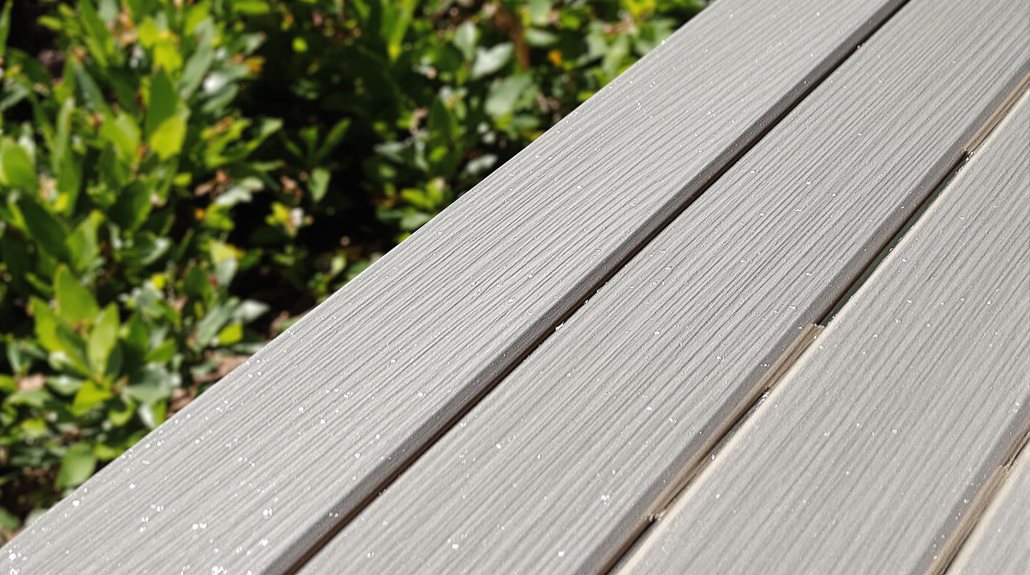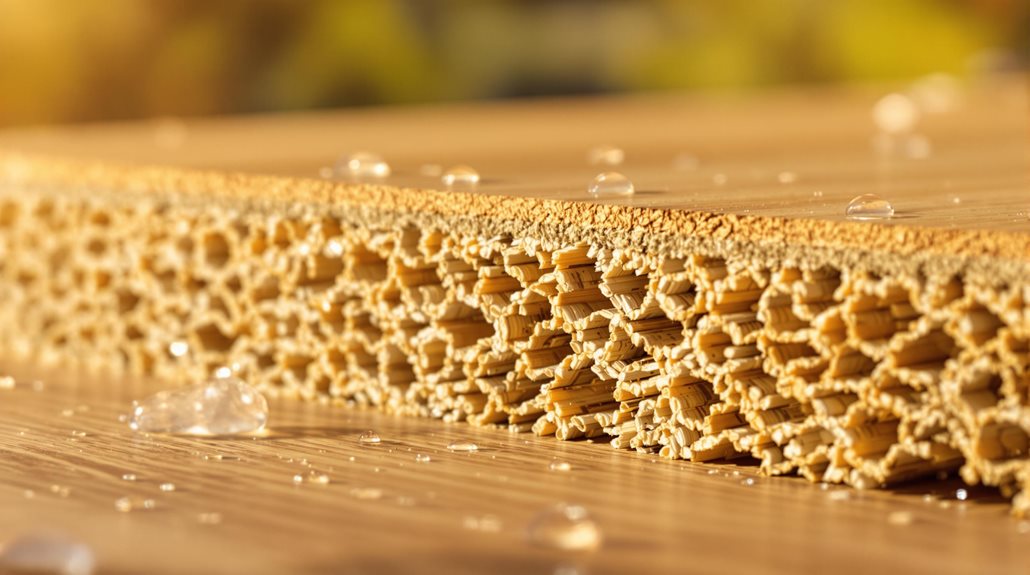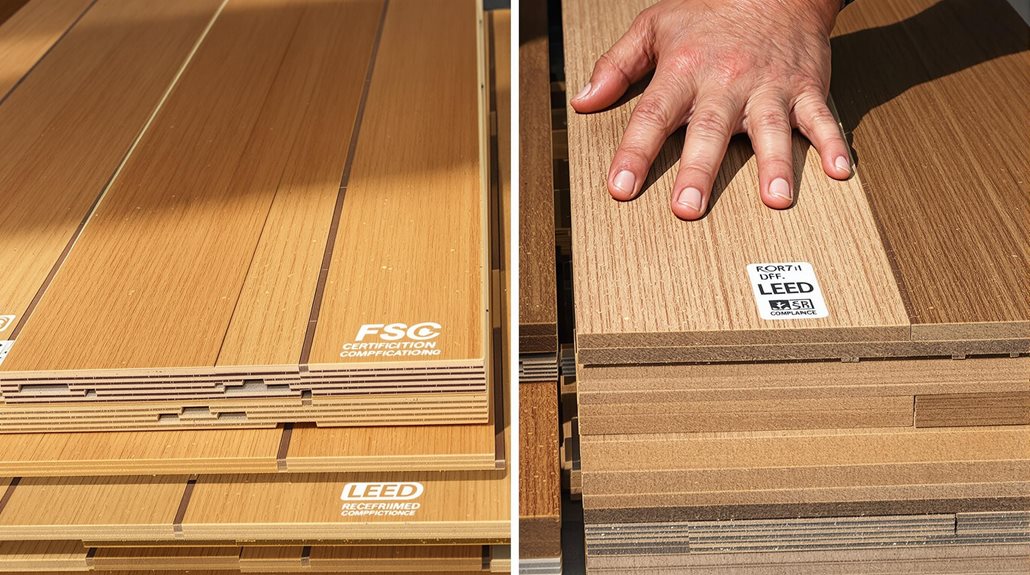Sustainable and Eco-Friendly Deck Building Materials: What You Need to Know
When building a deck, choosing sustainable and eco-friendly materials is essential to reduce environmental impact while guaranteeing durability and aesthetics. Recycled plastic decking, made from post-consumer waste like milk jugs, reduces landfill waste and requires minimal maintenance. Sustainably sourced hardwoods, certified by the Forest Stewardship Council, support ecological forestry practices. Innovative composite materials combining natural fibers like bamboo and hemp offer high strength and low maintenance. Reclaimed wood reduces deforestation and adds a unique aesthetic. Certifications like FSC and ISO 14001 guarantee responsible sourcing. By selecting these materials, homeowners can contribute to environmental stewardship while enjoying durable and beautiful decks. For more detailed insights into each option, explore the benefits and certifications that make these materials stand out.
Expert Highlights
- Recycled plastic decking reduces landfill waste and conserves natural resources, requiring minimal maintenance and no regular treatments.
- Sustainably sourced hardwoods, certified by FSC, support ecological forestry practices and offer durable, aesthetically pleasing options.
- Innovative composite materials combine natural fibers with eco-friendly binders, offering high strength, low maintenance, and reduced waste.
- Reclaimed wood reduces demand for new lumber, provides a unique aesthetic, and is highly durable with long-term savings.
- Certifications like FSC and ISO 14001 ensure sustainable sourcing and minimal environmental impact, validating the integrity of decking materials.
Recycled Plastic Decking: A Durable and Eco-Friendly Option

In the quest for sustainable deck building materials, one of the most promising solutions is recycled plastic decking.
Traditional decking materials like wood often require frequent maintenance and can contribute to deforestation.
Recycled plastic decking, on the other hand, offers a durable and eco-friendly alternative. Made from post-consumer plastic waste such as milk jugs and plastic bags, this material reduces landfill waste and conserves natural resources.
It is resistant to rot, mold, and insect damage, eliminating the need for regular treatments.
Additionally, recycled plastic decking requires minimal maintenance and can withstand harsh weather conditions.
By choosing this option, homeowners not only reduce their environmental footprint but also enjoy a long-lasting and low-maintenance outdoor space.
This sustainable choice aligns with the growing demand for eco-friendly building solutions.
Working with expert deck builders ensures proper installation and seamless integration with your home's architecture.
Sustainably Sourced Hardwoods for Deck Building
While recycled plastic decking offers a compelling eco-friendly option, many homeowners still prefer the natural aesthetic and warmth of wood for their decks.
However, traditional hardwood decking often comes with environmental concerns, such as deforestation and habitat destruction. To address these issues, sustainably sourced hardwoods have become a viable alternative. These woods are harvested from forests managed to maintain their ecological integrity, ensuring the long-term health of the forest ecosystem.
Certifications like FSC (Forest Stewardship Council) guarantee that the wood is sourced responsibly. Using sustainably sourced hardwoods not only preserves natural habitats but also provides a durable and beautiful decking material that resonates with homeowners who value both aesthetics and environmental stewardship.
This choice supports sustainable forestry practices and contributes to a more eco-friendly building approach.
For those seeking alternatives to traditional wood, composite decking materials offer an environmentally conscious choice while providing exceptional durability against various weather conditions.
Innovative Composite Materials Made From Natural Fibers

As the demand for sustainable deck building materials continues to grow, innovative composite materials made from natural fibers have emerged as a promising solution. These composites combine natural fibers like bamboo, hemp, or recycled wood with eco-friendly binders to create durable and environmentally friendly decking options.
| Material | Benefits |
|---|---|
| Bamboo | High strength, low maintenance, resistant to pests and rot |
| Hemp | Durable, UV-resistant, requires minimal treatment |
| Recycled Wood | Reduces waste, conserves natural resources, cost-effective |
| Soy-Based | Biodegradable, non-toxic, excellent durability |
| Cellulose | Lightweight, resistant to moisture, easy installation |
These composite materials offer a sustainable alternative to traditional decking options, reducing the environmental impact while providing long-lasting performance and aesthetic appeal. They are ideal for homeowners seeking eco-friendly solutions that also meet their functional needs. Our skilled craftsmanship ensures these sustainable materials are expertly installed to create beautiful, long-lasting outdoor living spaces.
Benefits of Using Reclaimed Wood for Decks
The decision to use reclaimed wood for deck building is driven by several compelling reasons, particularly in an era where environmental sustainability and resource conservation are paramount.
One of the primary challenges in traditional deck building is the demand for new lumber, which can lead to deforestation and waste. Reclaimed wood offers a solution to these issues.
Here are some key benefits of using reclaimed wood for decks:
- Reduced Environmental Impact: Using reclaimed wood minimizes the need for new lumber, thereby reducing deforestation and the carbon footprint associated with logging and processing.
- Unique Aesthetic: Reclaimed wood often has a distinct, weathered look that adds character and individuality to a deck.
- Durability: Many types of reclaimed wood have already endured years of exposure to elements, making them highly durable.
- Cost-Effective: While initial costs may be higher, reclaimed wood can last longer than new lumber, offering long-term savings.
Similar to our sustainable hardwood deck projects, reclaimed wood can be enhanced with natural finishes to preserve its distinctive character while ensuring longevity.
Certifications and Standards for Sustainable Decking Materials

When selecting sustainable decking materials, one of the paramount factors to take into account is the presence of certifications and standards that guarantee the material's environmental credibility.
Without these certifications, it can be challenging to ascertain that the materials are sourced responsibly and sustainably. Certifications like the Forest Stewardship Council (FSC) label indicate that the wood comes from forests managed to maintain their ecological integrity.
Another standard is the International Organization for Standardization (ISO) 14001, which certifies a company's environmental management system. These certifications provide assurance that the decking materials are ethically sourced and produced with minimal environmental impact, making them a vital aspect of sustainable deck building.
Similar to pergola construction, choosing materials that offer quality and durability is essential for creating long-lasting outdoor structures that minimize environmental impact through frequent replacements.
Frequently Asked Questions
How Do Eco-Friendly Deck Materials Compare in Cost to Traditional Options?
Eco-friendly deck materials often have a higher initial cost compared to traditional options, but they can offer long-term savings through durability and lower maintenance needs, making them a more economical choice over time.
Are Sustainable Deck Materials More Prone to Pests and Rot?
Sustainable deck materials, such as reclaimed wood and bamboo, can be more resistant to pests and rot due to their natural durability and treatment processes. However, some eco-friendly options may require additional maintenance to guarantee longevity.
Can I Use a Combination of Different Eco-Friendly Materials for My Deck?
Using a combination of different eco-friendly materials for a deck is feasible and can offer various benefits. It allows for the selection of materials that excel in different aspects, such as durability, aesthetics, and sustainability. For example, hardwoods like ipe or teak can be combined with composite materials made from recycled plastics and wood fibers. This approach can enhance the overall performance and visual appeal of the deck while maintaining an eco-friendly profile. Proper planning and compatibility checks are essential to guarantee a cohesive and functional design.
Do Sustainable Deck Materials Require Special Maintenance or Upkeep?
Sustainable deck materials often require similar maintenance to traditional materials, but some may need special care. For instance, bamboo and reclaimed wood might require periodic sealing or staining to protect against weathering and pests. Regular cleaning and inspections are also essential.
Are There Any Local Regulations or Incentives for Using Eco-Friendly Decking Materials?
Local regulations and incentives for using eco-friendly decking materials vary by region. Many cities offer tax credits, rebates, or zoning incentives to encourage the use of sustainable building materials, promoting environmental sustainability within the community._flip_
Expert Final Thougts
Choosing sustainable and eco-friendly deck building materials is an essential step towards reducing environmental impact. Recycled plastic decking, sustainably sourced hardwoods, innovative composite materials, and reclaimed wood offer durable and environmentally responsible options. Certifications like FSC guarantee these materials meet high standards. By opting for these alternatives, homeowners can enjoy long-lasting decks while contributing to a more sustainable future, preserving natural resources, and minimizing waste. This proactive approach not only benefits the environment but also enhances the value of your property.



